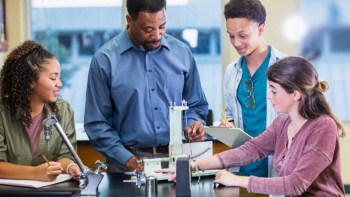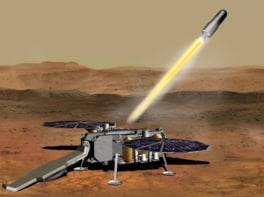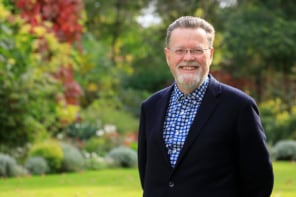Clare Burrage is a cosmologist and professor of physics at the University of Nottingham, where her research focuses on understanding what the universe is made of. She has recently won the 2023 Blavatnik Award for Young Scientists in the UK in Physical Sciences and Engineering for her work on detecting dark energy

What skills do you use every day in your job?
The type of research I do involves spotting connections between apparently unrelated physical systems and phenomena. I often feel like a detective. My colleagues and I are trying to solve a big puzzle – why does ordinary matter make up only 5% of our universe? And to figure out the answer, we look for clues. What is not quite behaving in the way it should? Is the same physics showing up in other physical systems?
Thinking about physics in this way made us realize that theories of dark energy – which have been proposed to explain why the expansion of the universe is accelerating – could be tested with tabletop experiments using cold atoms. That’s because the theories introduce a new force, which small objects like atoms would be particularly sensitive to. With the next generation of these experiments, we should be able to either detect the new force or rule out a popular cosmological theory.
Academic life is really broad, however, and every day is different. It’s not just research – some days are about supporting the people I work with; others are about teaching students; and some are about how to best communicate the work we’ve done. I used to do a lot of figure skating as a child, and I never expected the performance skills I learnt there to turn out to be so useful in my life as a physicist.
What do you like best and least about your job?
The best part of my job is the range of things I get to work on and all of the wonderful people that brings me into contact with. We look for connections between different areas of physics, but it is impossible for anyone to be an expert across it all, so I’m always looking to collaborate with other people. Often they are excited to see if their experiment or observations can be used to tell us something fundamental about the universe, but these collaborations take time to start up. Even within physics, different fields can be very far apart from one another, and feel like they’re speaking different languages. Even the units we use for physical quantities are different. But I really enjoy the process of learning something new and making those connections.
The worst part is that it is an indoor job. I spend a lot of time at the computer or doing calculations on paper or on the whiteboard. I have to make sure I find a balance by spending plenty of time in the hills outside of work. I do a lot of hiking and climbing, and skiing in the winter.
What do you know today that you wish you knew when you were starting out in your career?
I wish I could have known that this career path would work out for me. Each year many more people get PhDs in our field than there are openings for new permanent academic positions. Not everyone wants to go into academia, but there are still many more people who do than there are positions available. No matter how good you are, you need a lot of luck for things to work out.
For me there was a period of about five years between getting my PhD and getting a permanent position in which I was on a series of short-term contracts, and I made three international moves – from the UK to Germany, to Switzerland and then back to the UK. I found it hugely stressful not knowing where I would be living, from one year to the next; and whether these big disruptions to my life would be worth it in the long run.
I also wasn’t sure whether the research that I wanted to do was something the community would find interesting. When I started out, the idea that you could test theories of dark energy with laboratory experiments was seen as either a niche topic or completely crazy, depending on who you asked. I’m really happy to see that change, and that more people are realizing the opportunities that often quite small-scale experiments can provide to help understand our universe.


